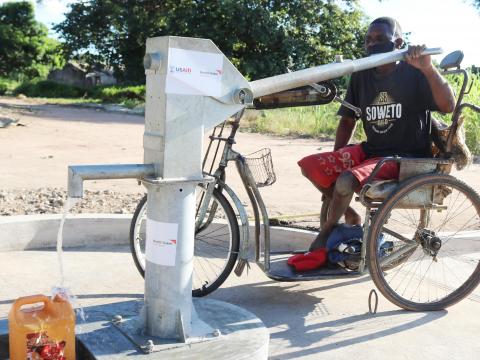Ensuring access to clean water for people with disabilities through inclusive water initiatives

It is 2:17 pm in Madibunhana community, central Mozambique, and David (54) is riding a wheelchair to fetch water under the scorching heat of the sun at the borehole that is about 700 metres away from his house. This activity is part of his afternoon schedule, as he can get clean and safe water without having to stay in the queue that characterises the first hours of each day.
It wasn't always like this. The father of two used to ride about three kilometres to carry dirty water from a river near his community, despite all the challenges that people with disabilities are experiencing countrywide. “I remember that on several occasions we had to end up at hospital due to diarrhoea, that later the doctors told us was caused by the consumption of dirty water from that river”, reveals David.
The water system had suffered severe damage due to the fury of the floods that followed Cyclone Idai, which hit the country in March 2019 and forced community members to turn to Lucite Rivers banks to fetch water.
Currently, David lives only with his wife Celeste because the scarcity of resources to feed his girls Domingas (20) and Amélia (15), forced him to send them to live with their parents. “My handicapped situation does not allow me to do much. To feed ourselves we depend on food assistance”, laments David. “I felt the need to be useful to my family. My wife goes to the farm to get food and does other tasks. I thought to contribute by bringing water to meet our needs”.
To meet David's needs and those of 220 other households of Madibunhana community, World Vision has rehabilitated and modernised the nearby borehole incorporating a ramp that allows people with disabilities to, independently, access adequate water. This with funding from the United States Agency for International Development's Bureau for Humanitarian Assistance (USAID-BHA).
“I thank World Vision for relieving us through this borehole that is providing us clean water. This water source is making it easier because I can fetch water without depending on anyone. Now we're drinking good water”, says David.
Cyclone Idai had not only deprived David of the possibility of consuming adequate water, it also took away his right to shelter. “I lost everything. If this wheelchair of mine is so degraded, it is because it was submerged for three days, in floods. Since then, moving from one point to another became challenging”, he shares.
“I've survived thanks to my cousin who helped me to climb a small mountain before the rescue arrived. I would be dead but God helped me a lot,” adds David pointing to the sky.
The rehabilitated borehole in Madibunhana community is part of the 50 that the partnership between World Vision and USAID-BHA is readapting. This is including the construction of 70 inclusive wells, three water systems to provide clean and safe water to communities, as well as the provision of material subsidies for the construction of inclusive latrines for around 122,900 survivors of Cyclone Idai.
Apart from this, the project is working with established community structures to impart knowledge on good health and hygiene practices and the overall management of established water, sanitation, and hygiene infrastructures.
--------------------------
By: Lourino Pelembe - Communications Officer, World Vision in Mozambique